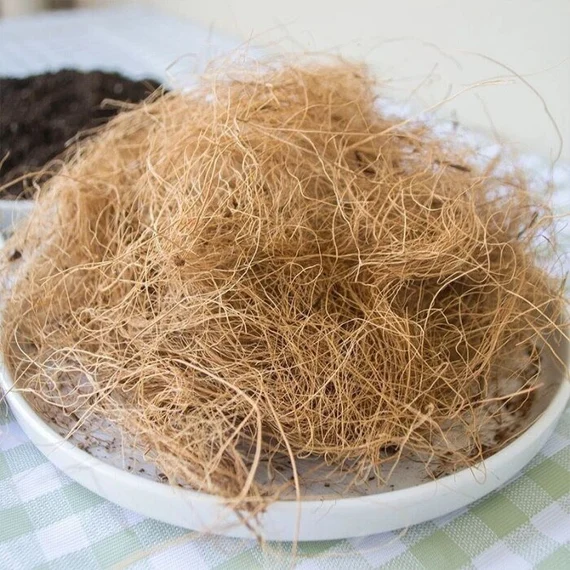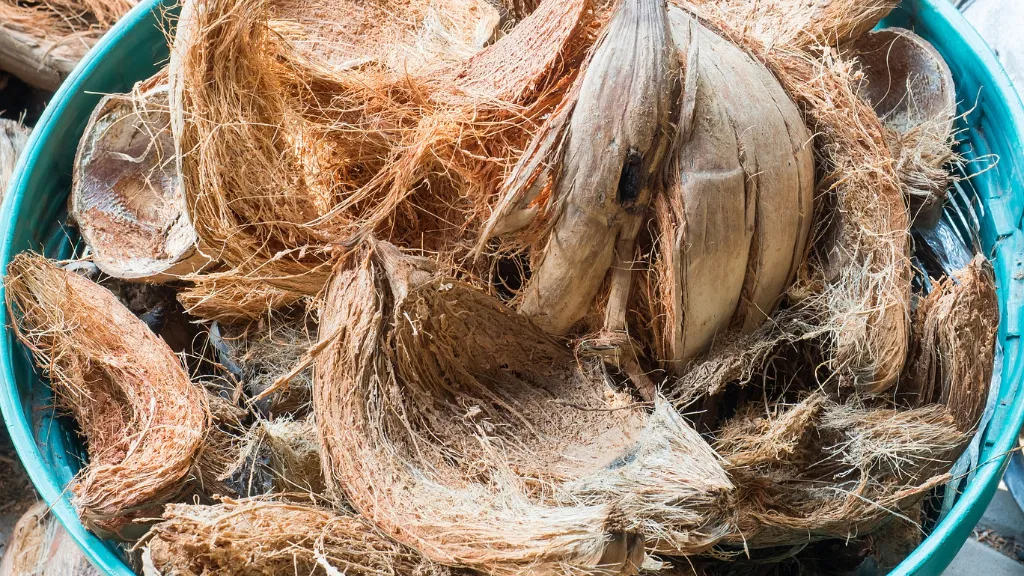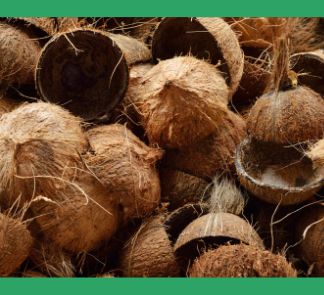Coconut fiber, also known as coir, is a natural material extracted from the outer husk of coconuts. It is known for its strength, durability, and versatility. As a byproduct of coconut farming, it is eco-friendly and widely used in various industries.
Coconut fiber comes in two main types—brown coir and white coir. Brown coir is harvested from mature coconuts and is thick, strong, and coarse, making it ideal for creating products like ropes, mats, and brushes. White coir, on the other hand, is extracted from unripe coconuts. It is softer, finer, and more flexible, which makes it perfect for producing items like fishing nets and finer-grade brushes. Both types contribute significantly to the wide range of products that depend on coir’s unique properties.
The production of coconut fiber involves soaking coconut husks in water to loosen the fibers, followed by a process called retting. Once separated, the fibers are cleaned, dried, and further processed depending on their intended use. This process ensures that the fiber retains its natural strength and durability, making it one of the most reliable and eco-friendly materials available. The versatility of coconut fiber has made it an integral part of industries ranging from agriculture to construction, where it is celebrated for both its functionality and sustainability.
Uses of Coconut Fiber
Coconut fiber has a wide range of applications across industries and everyday life, offering unique properties that make it incredibly useful:
1. Textiles and Crafts
Coconut fiber is heavily utilized in creating a variety of textile products. For example, thick and durable ropes used in construction, fishing, and other industries are often crafted from brown coconut fiber due to its strength. Coir mats, doormats, and brushes are also common products made from this fiber. These items are not only functional but also aesthetically pleasing, often showcasing traditional craftsmanship. Moreover, coconut fiber is used to produce sacks for packaging agricultural products, as it provides breathability and durability, preventing moisture buildup.
2. Gardening and Agriculture
In gardening, coconut fiber is a preferred growing medium for plants, particularly in hydroponic systems. Its excellent water retention and aeration properties make it ideal for promoting healthy root growth and preventing waterlogging. Coir is also used in seed starters and potting mixes, helping young plants thrive by providing balanced moisture levels. Additionally, coconut fiber can be turned into mats used for erosion control, protecting soil from washing away during heavy rains.
3. Construction Materials
Coconut fiber has found its place in construction as an eco-friendly alternative to synthetic materials. It is used to create insulation boards that are not only effective in regulating temperature but also biodegradable. Some innovative projects even utilize coir as reinforcement in composite materials, adding strength and durability to building components while minimizing environmental impact.
4. Household Products
Coir-based products are common in households, providing everyday functionality. Brushes made from coir are widely used for cleaning, thanks to their natural abrasiveness and resistance to wear. Mats and rugs woven from coir fibers are durable, water-resistant, and visually appealing, making them suitable for both indoor and outdoor use.

Benefits of Coconut Fiber
Coconut fiber stands out for its versatility and sustainability, offering a range of benefits that contribute to its popularity:
1. Eco-Friendly
As a byproduct of coconut farming, coir is renewable and biodegradable. Its use minimizes waste, as the fiber repurposes coconut husks that would otherwise be discarded. This makes it a sustainable alternative to synthetic materials, reducing environmental harm.
2. Durability
Coir is known for its remarkable strength and resistance to wear, making it suitable for long-lasting applications. Whether used in ropes, mats, or brushes, coconut fiber maintains its integrity even under tough conditions.
3. Water Retention
One of the most important properties of coconut fiber is its ability to hold moisture. This characteristic is especially valuable in gardening, where balanced water retention supports plant growth and reduces the need for frequent watering.
4. Lightweight and Easy to Handle
Despite being strong and sturdy, coconut fiber is lightweight, making it easy to transport and work with. This feature adds to its appeal for crafts, gardening, and construction.
Dos and Don’ts When Using Coconut Fiber
To make the most out of coconut fiber, it’s essential to follow some best practices while avoiding common mistakes:
Dos
1. Reuse Coconut Fiber
Reuse coir in gardening or crafting whenever possible. For example, after its initial use in a planting pot, it can be cleaned and repurposed for compost or as mulch.
2. Prepare Properly
Washing and drying coconut fiber before use is crucial, especially if it will be used in crafting or agriculture. This process removes impurities and ensures that the fiber performs optimally.
3. Mix It Wisely
When using coir in gardening, mix it with other soil amendments to maintain balance. Coconut fiber is excellent for retaining moisture, but combining it with sand or perlite can improve drainage.
Don’ts
1. Avoid Harsh Chemicals
Exposure to harsh chemicals can degrade coconut fiber, reducing its lifespan and effectiveness. Stick to natural treatments when cleaning or preparing coir.
2. Don’t Overuse in Soil
While coconut fiber is great for plant health, adding too much can disrupt soil aeration, potentially leading to poor root development.

Pros and Cons of Coconut Fiber
Like any material, coconut fiber has its advantages and limitations. Here’s a detailed look:
Pros
1. Renewable and Sustainable
Coconut fiber is sourced from the husk of coconuts, a renewable resource. Its use reduces waste, contributing to a greener and cleaner environment.
2. Affordable and Accessible
Coir is widely available in regions where coconuts are grown, and its affordability makes it accessible to businesses and individuals alike.
3. Biodegradable
Unlike synthetic fibers, coconut fiber breaks down naturally over time, leaving no harmful residue behind. This makes it an eco-friendly choice for various applications.
4. Highly Versatile
Whether used for gardening, crafting, construction, or household products, coconut fiber can be adapted to countless purposes, showcasing its versatility.
Cons
1. Not Pest-Resistant
Over time, coconut fiber may become susceptible to pests, particularly when used outdoors or in agriculture. Proper maintenance and treatment can mitigate this issue.
2. Requires Maintenance
Products made from coconut fiber, such as mats and ropes, may require cleaning and care to maintain their quality and extend their lifespan.
3. Limited Strength in Heavy-Duty Applications
While coir is strong, it may not match the durability of synthetic fibers in heavy-duty applications. It is better suited for lighter tasks.
Conclusion
Coconut fiber is a remarkable natural material with a wide range of applications and benefits. Its eco-friendly nature makes it a valuable resource for sustainable living, while its versatility ensures it has something to offer for everyone—from gardeners to builders and artisans. By using coconut fiber responsibly and understanding its strengths and limitations, you can unlock its full potential in your projects and daily life.

